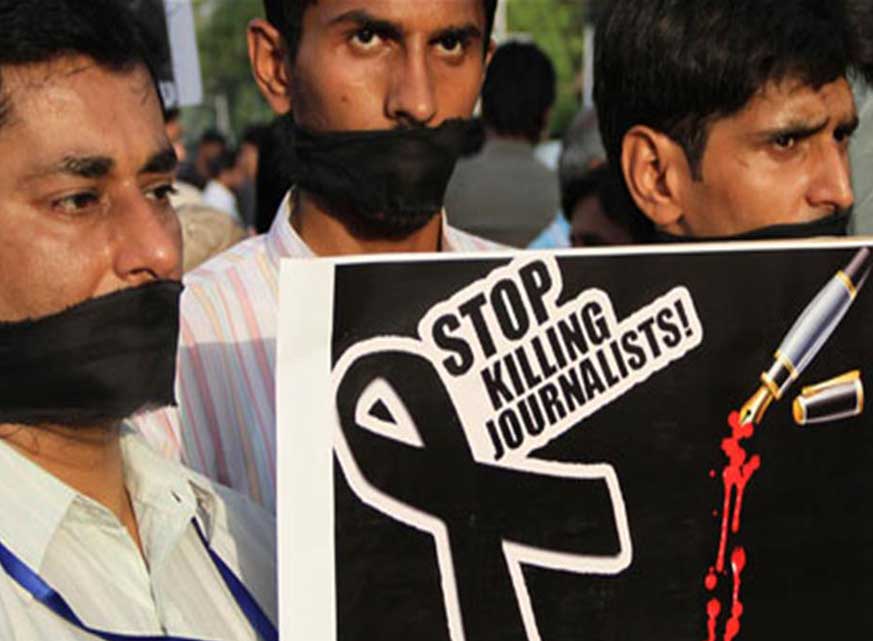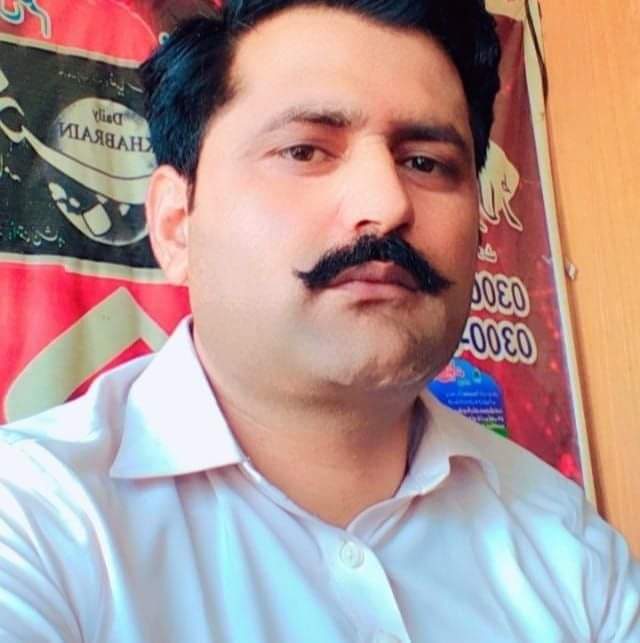RMNP says media workers face increasing risks in rural Pakistan
On the occasion of International Day to End Impunity for Crimes against Journalists on 2 November, the Rural Media Network Pakistan (RMNP) stressed that media workers face increasing risks in different areas of Pakistan and demanded Pakistani government to make concreate efforts to address toxic levels of impunity that continue to blight journalism and the safety of media workers across the country.
Marking the UN International Day to End Impunity for Crimes Against Journalists, the RMNP has put the spotlight on the rural areas of Pakistan as majority of the journalists killed in the line of dauty since 2000 hail from rural areas and small towns while Pakistani media is urban oriented.
“Pakistani government has overwhelmingly failed to deliver justice for journalists killed, threated or injured as a result of their work,” RMNP said. “The impact of government and state failures to address these attacks has been the subsequent creation of a climate of lawlessness, violence and impunity for media attacks that only emboldens perpetrators and ensures further targeted killings.”
Pakistan is considered one of the the deadliest country in the world for journalists. During current year , four journalists and media workers lost their lives in the line of duty according to the RMNP ‘s killed journalist list. Armed insurgency and sectarian violence are a leading cause for deaths but many other cases raise suspicion to the involvement of state institutions.
Sadly, Pakistan has so far recorded only three convictions in its long list of journalist murders. In March 16, 2016, a court in Khyber Pakhtunkhwa sentenced the killer of Jang Group journalist Ayub Khattak, killed in 2013 to life imprisonment;.Most of media personnel in Pakistan belong to middle class and do not have the financial resources
to contest the cases against influential people who killed or injured their loved ones.
.
RMNP has so far documented FIVE cases where court proceedings were withdrawn because of agreements between the accused and families of the victims
Threats and violence have forced many journalists to move from these danger zones and to leave the profession or to resort to self-censorship, particularly in conflict areas.Several journalists have migrated to other countries with the support of international media organisations and press freedom groups.
.
It is worth mentioning that accused Tashfeen Malik involved in California,United States firing incident hails from South Punjab.Similarly on January 16,2015 one person was killed due to remote bomb blast in Chanigoth a place 30 kilometers away from RMNP base , while an unidentified man was lynched on the charge of desecration after being recovered from police custody by a mob in Chanigoth on July 4,2012.The angry mob of over a thousand people stormed the Chani Goth Police Station at around 5 pm, broke open its lock up and took the alleged blasphemer to Chanigoth Chowk dragging him along the ground. Before leaving, the mob also set the police station and four mobile vans on fire. Local president press club Shahid Bashir was threatened of dire consequences on phone by Malik Mohammad Ishaq head of extremist banned outfit for not airing the footage of this incident on his respective TV channel.Last year Muhammad Ishaq and his sons along with fighters were gunned down by Punjab Police in Muzzafar Garh district of South Punjab, but later Punjab government abandoned the operation following severe reaction from Malik Ishaq outfit. His fighters took revenge of his killings by killing the late Punjab Interior minister Shujah Khanzada in a powerful suicide bombing at his home town in Attock district. On October 2015, seven persons were killed and 13 injured in bomb blast incident which occurred at the dera of ruling party MNA in Taunsa,Dera Ghazi Khan district of South Punjab. Meanwhile a dangerous terrorist Qari Suhail was hanged to death in Sahiwal jail on March 24 this year, he was involved in Bannu jail break in which 384 Talibans were got freed and two constables were shot dead on April 4,2012 in Khyber Pakhtunkhwa province. Terrorist Qari Suhail was activist of Lashkar-e-Jhangvi in which funeral on March 24,2016,banned sectarian organization workers chanted slogans against opposite sect. Now Police have arrested 12 persons including the father and three uncles of terrorist Suhail and are searching 61 other activists who have gone underground. Terrorist Qari Suhail was resident of Mauza Baqapur a place situated 25 kilometers away from RMNP base.
“Terrorism, religious extremism, sectarian violence and alarming security situation of Pakistan demands strict safety measures for journalists. They put their life in danger to cover different assignments. Reporters in the rural areas are the back bone of newspapers and private TV channels. Unless fully prepared to protect personal safety, they can’t play their professional role” As a front line country in the war against terrorism, Pakistan is a dangerous place to practice journalism. Standing at the front lines of violent conflict, Pakistan is under tremendous pressures internally and externally, which means that its people need accurate information about how its institutions – governmental, economic, religious, educational – are functioning. And its press, in turn, needs help to develop the skills and standards so it can gather and distribute that information. Journalists also need safety and first aid training. Thus, the need for skilled, ethical and courageous reporting has never been greater in Pakistan than it is today. South Punjab, a home of 50 million people is in the grip of religious extremism and sectarian violence now days. Law enforcement agencies have arrested dangerous terrorists from various areas of South Punjab who are activists of banned religious organizations including their mastermind a PHD degree holder. Suicide jackets, hand grenades, mine, and explosive material in heavy quantity was also recovered from an area seven kilometers away where RMNP is based. This situation demands strict safety precautions from media men. They put their life in danger to cover different assignments. Religious extremism is spreading in different parts of the country. Sectarian organizations fighting for domination.
The last two decades have witnessed increased freedom for the print media and a liberalization of the broadcasting sector in Pakistan. The transformation towards a freer political and media environment begun in 1988, and the relaxation of procedures for starting new publications has resulted in mushrooming of a number of newspapers and magazines leading today to 850 publications including 130 dailies in the country. In big cities, dozens of newspapers compete for limited circulation and advertisement..Similarly the number of working journalists in the country had risen from 2,000 to 20,000 over the years. Of them, around 70 per cent did not have a degree in journalism. There’s been a considerable decline in the number of newspapers in the West whereas in Pakistan the print media seems to be enjoying sustainability, “However that does not mean that other mediums will not proliferate. From just one private television channel in 2002 we have over a 100 private TV channels now. Same is the case with print. There are 150 radio channels at the moment, though they only prefer playing music.
–
Historically, the growth and development of media in Pakistan has been in the main metropolitan centers. This phenomenon is not unique to Pakistan. However, what is perhaps different in the Pakistan context, and in fact in most developing economies, is that this growth has remained confined to the urban centers and has not filtered down to the districts. The district correspondent thus remains neglected, often working in isolation and with very little support from his organization whether financial, moral or professional. District correspondents are often poorly educated and grossly unpaid–or even unpaid—journalists who can not rely on journalism for their sustenance. In the cities new comers learn from senior colleagues but in rural areas correspondents generally work alone and do not get on the job training.
There is great need to raise the status and standing of rural journalists who are generally treated very poorly. They are asked to guarantee the sale of newspapers in the area and in some cases asked to deposit money for the issuance of press cards. There is no job security and the rural journalists with many years of service can be fired without just cause. Feudal lords as well as officials and the police resort to bribes, threats, physical force and imprisonment to prevent rural journalists from reporting unpleasant news. South Punjab is a part of the country’s biggest Punjab province where extremists and militants have strong base. Religious extremists force journalists to cover their speeches and pressurize them to publish their news word by word
Recommendations by Rural Media Network Pakistan to end impunity for crimes against media
Rural Media Network Pakistan (RMNP), is only non-governmental organization which is based in rural Pakistan committed to promoting and defending freedom of expression recommends the following measures be adopted to control the alarming level of violence against media, and to end impunity for those who attack media practitioners and institutions.
1-A special prosecutor on violence against media should be appointed at federal and all four provincial head quarters to investigate cases of violence against media.
2- Criminal cases should be registered without any delay but should also be properly investigated and prosecuted against the perpetrators of violence against media.
3- Media houses should take the responsibility in ensuring safety of media personnel. All Pakistan Newspapers Society(APNS),Pakistan Broadcasters Association ,Council of Newspapers Editors(CPNE) along with three factions of Pakistan Federal Union of Journalists (PFUJ) should ensure long-term follow up of cases of assault on media organizations and workers
4- Journalists should be provided with safety and first aid trainings and guidance on how to report in hostile environment. Journalists working in conflict areas should also be provided with guidance in recognizing and dealing with stress and post traumatic stress.
5-All media houses should provide safety equipment to their reporters i.e. bullet proof jackets, helmets and GPS Cell phones irrespective of the size of city.
6-All media houses should provide insurance cover to their reporters, cameramen and supporting staff who cover dangerous assignments.
7- Media house should pay at least one million rupees to the widow of a rural area journalist who is sending them news under any kind of arrangement written or verbal what so ever, if he is killed during the coverage of dangerous assignment and 0.5 million rupees if he gets serious injuries.
8-Media house should pay all the expenses incurred on his medical treatment until and unless he is fit to resume his routine activities.
9-All media houses should take immediate steps with consultation of concerned authorities for the safety of newsmen working in sensitive areas like Southern Punjab.
10- All media houses should take follow up actions if a journalist is kidnapped in line of his duty and make sure that he is released safely, without any harm.
.
11-Pakistan government should provide announced compensation of the previous government to the heirs of those slain journalists who had been killed in the line of duty.
12- Pakistan Bar Council and all four provincial bar councils should be taken on board to get the speedy information about the judicial follow up of the cases.



